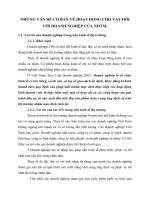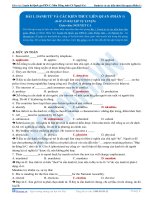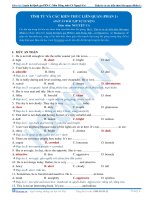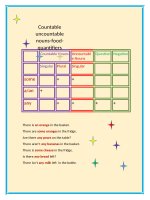bài tập về articles
Bạn đang xem bản rút gọn của tài liệu. Xem và tải ngay bản đầy đủ của tài liệu tại đây (143.62 KB, 3 trang )
Articles
Articles
∗ Form
∗ Use
I. Form & Pronunciation
Indefinite article
A, AN + singular, countable nouns a student, a book, an idea
Not: a students, an ideas, a water (U), a
music (U)
Definite Article
THE +
N euncountabl
N plural
N countablesingular
the man
the shoes
the water
Indefinite article
A + Consonant sound
a book, a car, a day, a friend, a girl
But: an hour
AN + Vowel sound
We base on the pronunciation, not
the spelling to decide “a” or “an”.
an apple, an egg, an interview, an
old coat, an umbrella
But: a university
Definite Article
THE [đə] + Consonant Sound the book, the car, the girl
THE [đi:] + Vowel sound the end
II. Use
A, AN
1. A, AN is used when the listener or reader does
not know exactly which person or thing we mean
- There is a book on the table.
(We don’t know which book.)
- He met a girl last night. She works in a bank.
(We don’t know which girl or which bank.)
2. We use A, AN when we say what someone or
something is.
- I’m an architect.
- He’s a vegetarian.
- It was a good film.
3. We use A, AN (meaning any) to talk about
something in general.
- A vegetarian doesn’t eat meat.
- An architect designs buildings.
THE
1. used to talk about people or things that we
have already mentioned
− I met a girl and a boy. I didn’t like the boy
very much, but the girl was very nice.
− My father bought a shirt and some shoes. The
shoes was quite expensive.
2. We use THE when we say which person or
thing we mean.
- Who is the man over there talking to Sue?
3. We use THE when it is clear from the
situation which person or things we mean.
− “Where’s Simon?” “He’s in the bathroom.” (=
the bathroom in this house.)
− Are you hot? I’ll open the window. (= the
window in this room.)
− I got into a taxi. The driver asked me where I
wanted to go. (= the driver of the taxi.)
4. used to mention the only one thing the sun, the moon, the earth, the Queen
5. used with superlative adjectives
− He is the richest man in the world.
6. Used before proper name of
1
- oceans, seas, rivers, canals, plural lakes,
- deserts, island groups
- hotels, theatres, museums, clubs,
restaurants, pubs
- newspapers
But: not with hotels, restaurants, churches, ...
named after the people who started them or saints
+ the possessive ‘s
− the Pacific, the Red Sea, the Nile, the Panama
Canal
− the Sahara, the Canaries
− the Plaza, the Cannon Cinema, the Prado
Museum, the Black Cat Club, the Hard Rock
Cafeï, the Swan (pub), the Times,
The Macy’s Hotel, The Lloyds Bank, The
Woolworths, The St Peter’s Church, The St
Paul’s Cathedral
7. used to talk about something in general
− species of animals, flowers and plants; cinema,
theatre; musical instruments, inventions
THE + singular count N
− The dolphin is an intelligent animal.
− The orchid is a beautiful flower.
− Which do you prefer, the cinema or the
theatre?
− She can play the guitar and the saxophone.
− Marconi invented the radio.
− groups of people
THE + Adj
− The young should listen to the old.
− The English drink a lot of tea.
NO ARTICLE
When talking about things in general
− I like potatoes.
− Milk is good for you.
Before places when we think of the main
purpose of the place
− I think I’ll go to bed early tonight. (to sleep)
− Maria goes to school every morning. (to study)
− Mr. Woods has gone into hospital. (for medical
treatment)
Before countries, states, departments,
towns, cities, village, streets,
− I live in Cantho.
Before lakes, individual mountains Lake Michigan, Lake Geneva, Mount Everest, Mount
Fuji
Before languages, meals, holidays
− I had lunch with John.
Before parts of the body, and some
forms of transport
− She goes to work by bus (/plan / car / train)/on foot.
2
ASSIGNMENT ON “PRONOUNS”
1. How many kinds of Pronouns are there in English? What are they?
2. Which pronouns are included in each kind of Pronoun?
• Personal Pronoun:
3. How many kinds of Personal Pronouns are there in English? What are they?
4. What are differences between them? (functions and positions in sentences)
5. List all situations that Personal Pronouns are used. Give one example for each case.
6. List all special situations that “It” is used. Give one example for each case.
• Possessive pronoun
7. What are the forms of Possessive pronoun? (Imine, you….,…)
8. When do we use Possessive pronoun?
• Possessive pronoun
9. What are functions and positions of Possessive pronoun? Give one example for each case.
• Reciprocal Pronouns
10. How many Reciprocal Pronouns are there in English? What are they?
11. What are differences between them?
12. What are functions and positions of Reciprocal noun? Give one example for each case.
• Demonstrative Pronouns
13. How many Demonstrative Pronouns are there in English? What are they?
14. What are differences among them?
• Interrogative Pronouns
15. How many Interrogative Pronouns are there in English? What are they?
16. What are differences among them? (which are used for person? Which for thing? What are their
functions in sentences?)
• Relative Pronouns
17. How many Relative Pronouns are there in English? What are they?
18. What are differences among them? (which are used for person? Which for thing? What are their
functions in sentences?)
3









